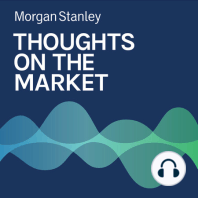3 min listen

Special Episode: Inflation, Energy and the U.S Consumer
Special Episode: Inflation, Energy and the U.S Consumer
ratings:
Length:
8 minutes
Released:
Mar 10, 2022
Format:
Podcast episode
Description
As inflation remains a focal point for the U.S. consumer, higher energy costs will dampen discretionary spending for some. But not all are impacted equally and there may be good news in this year’s tax refunds and the labor market.-----Transcript-----Ellen Zentner: Welcome to Thoughts on the Market. I'm Ellen Zentner, Morgan Stanley's Chief U.S. Economist. Sarah Wolfe: And I'm Sarah Wolfe, also on Morgan Stanley's U.S. Economics Team. Ellen Zentner: And today on the podcast, we'll be discussing the outlook for the U.S. consumer during this year's tax season and after, as inflation remains in the driver's seat and new geopolitical realities raise further concerns. It's Thursday, March 10th, at 9:00 a.m. in New York. Sarah Wolfe: So, Ellen, I know you want to get into the U.S. consumer, but before we dig in, I think it would be useful to hear your view on the overall U.S. economy, especially given the new geopolitical challenges. Ellen Zentner: So, I think it's helpful to think about a rule of thumb for the effects of oil on overall GDP. For every 10% sustained increase in oil prices, it shaves off about one tenth on GDP growth. And so when we take into account the rise in energy prices that we've seen thus far, we took down our growth forecast for GDP this year by three tenths and shaved off an additional tenth when looking further out into 2023. Now, one thing that I think is important for the U.S. outlook versus European and U.K. colleagues is that energy prices are a much bigger factor in an economy like Europe's, and the U.K.'s where they're much more reliant on outside sources, where in the US we've become much more energy independent over the past decade. But I think where I step into your world, Sarah, as we think about higher oil prices, then translate into higher gasoline prices, which hits consumers in their pocketbook. So Sarah, that's a great segue to you on the U.S. consumer because this has been one of your focuses on the team. Consumers don't like higher prices. And, you know, we've been seeing this big divergence between sentiment and confidence. So why aren't those measures moving exactly hand in hand if inflation is the biggest concern there? Sarah Wolfe: Definitely. There's a lot of focus on consumer confidence, which comes from the Conference Board and consumer sentiment, which comes from University of Michigan. Both have been trending down, but there's been a record divergence between the two, where Conference Board is sitting about 48 points higher than sentiment. And inflation plays a huge role in this. So just getting down to the methodology of the surveys, the reason there's been such a divergence is because Conference Board places more of a focus on labor market conditions, whereas University of Michigan sentiment focuses more on inflation expectations. And so when you're in an environment like today, where the unemployment is very low, the labor market is very tight, that's very good for income that gets reflected through the confidence surveys. But at the same time, inflation is extremely high, which erodes real income, and that's getting reflected more in the sentiment survey. So, we are seeing this large divergence between the surveys and they're telling us different things, but I think both are very important to take into account. Ellen Zentner: So let me dig into inflation a little bit further then specifically and how it affects you when you're thinking about our consumer spending outlook. I mean, some of the changes that we've made to CPI forecast, you know, talk us through that and how you're building that into your estimates for the consumer. Sarah Wolfe: So we recently raised our headline forecast for CPI, or Consumer Price Index, inflation for the end of this year by 40 basis points to 4.4%. And we've also lowered our forecasts for real Personal Consumption Expenditure, or PCE, but only about 10 basis points this year to around 2.8%. And the reason that it's not a one for one pass through i
Released:
Mar 10, 2022
Format:
Podcast episode
Titles in the series (100)
Mike Wilson: How Confident Are U.S. Businesses in the Economy? by Thoughts on the Market